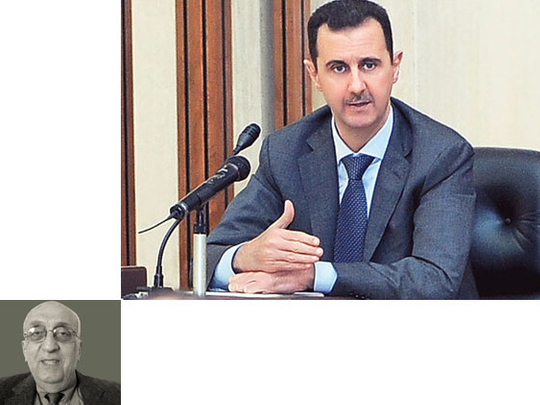
As fall, the American term for autumn, approaches, seemingly slowly, two seasons after the launching of the Arab Spring noted for the unprecedented uprisings that have so far swept three Arab regimes — Tunisia, Egypt and Libya — the troubling question remains when will this Arab tsunami end since two additional autocratic regimes — Syria and Yemen — are still in the midst of bloody confrontations.
Their days may be numbered especially that 193 leaders or senior representatives of the world community are expected to focus on the ongoing uprisings in the Arab world at the United Nations General Assembly meeting in New York later this month.
Preceding the annual session, the UN Security Council is also scheduled to take up another key Arab issue that has galvanised the Middle East as well as many world powers, namely the Palestinian determination to obtain UN recognition for statehood.
This would normally have been a procedural step, except that Israel, and astonishingly, its arch-protector, the US, are insisting on direct Israeli-Palestinian negotiations. This is the position favoured by the Israeli government, which, much to the chagrin of the Palestinians and many other states, has refused to curtail its illegal expansion within the Occupied Territories. The issue has nixed chances of any meaningful peace talks between the two feuding parties.
Presently, Israel finds itself being literally pummelled by Egyptians and Turks, two significant neighbours, for killing innocent Egyptian policemen serving on the Egyptian-Israeli border in the Gaza Strip region as well as nine unarmed Turks, including an American citizen, aboard a Turkish-flagged vessel that was part of the Gaza aid flotilla last year.
Turkey's Prime Minister Recep Tayyip Erdogan was quoted as saying last week that he saw "grounds for war" with Israel after its deadly raid, according to a just-released transcript in Turkish of a recent interview with Al Jazeera television.
In reaction to the Israeli assaults, Egyptian demonstrators have attacked the Israeli embassy in Cairo, forcing the Israeli ambassador and most of his staff to escape by nightfall to Israel.
Erdogan's tour
A tentatively planned trip for Erdogan to the besieged Gaza Strip was temporarily postponed so as to include Palestinian leader Mahmoud Abbas since it was intended to serve as a loud demonstration of support against the illegal Israeli blockade. Still, Erdogan, now considered a hero by Arabs for his recent stance against Israeli policies, chose to visit Cairo on Monday on the first leg of a Middle East tour. He reached Tunisia yesterday and is expected to visit Libya.
And, adding fuel to the pro-democracy fire raging in the Arab world, Erdogan warned in a newspaper interview last Tuesday that he anticipated possible civil war in Syria between the majority Sunnis and Alawites, who comprise the ruling elite.
Coincidentally, the ongoing bloody crackdown by three Arab regimes, particularly Syria, has prompted a public reprimand of Syrian President Bashar Al Assad from his close ally, Iranian President Mahmoud Ahmadinejad.
The Iranian leader advised Al Assad to negotiate a settlement with his Syrian opponents rather than wage a bloody suppression which has so far cost, according to the UN, the lives of over 2,600 pro-democracy demonstrators.
Civilian casualties
Since the Syrian regime challenged these figures, the UN has named a three-member panel of international experts to investigate the alleged human rights violations there. This also followed Russia's rejection of calls for wider sanctions on Syria as favoured by France, Britain, the US, Germany and Portugal.
There is a widespread Syrian (and popular Arab) view, observed on some placards hoisted by anti-Al Assad demonstrators arguing that their call for western intervention, similar to what happened in Libya, is being rejected because Syria, unlike Libya, is not an oil-rich state. This is akin to view in the Arab world that former US president George W. Bush invaded Iraq primarily to control its vast oil wealth.
The Arab world has disappointingly failed to come up with a solution to the Syrian debacle. Whether the Arab League is eventually able to bring about a peaceful settlement remains to be seen. In the meantime what has lately been unprecedented has surfaced in a column by Prince Turki Al Faisal, a former Saudi ambassador to the US and former director of Saudi Arabia's intelligence services. He no doubt was reflecting official Saudi view since his brother is the Saudi foreign minister.
Although the column was primarily a public warning to the US over its threat to veto Palestinian membership in the UN, the Saudi prince was categorical about his country's position vis-a-vis the deteriorating situation in Syria:
He wrote: "Saudi Arabia recently played a leading role in isolating Syrian President Bashar Al Assad's brutal government by demanding an end to the killing of protesters and recalling the Saudi ambassador from Damascus. The impending fall of Al Assad's barbarous regime provides a rare strategic opportunity to weaken Iran. Without this vital ally, Tehran will find it more difficult to foment discord in the Arab world."
The price that Saudi Arabia is demanding to cooperate with the US in this enterprise, he implied, is for the Obama administration to abandon its veto against Palestinian admission to the UN.
George S. Hishmeh is a Washington-based columnist. He can be contacted at ghishmeh@gulfnews.com











